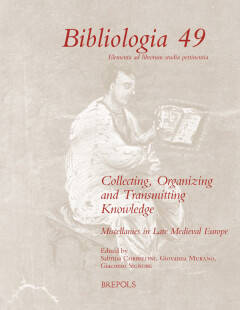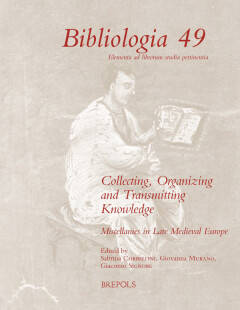
Door een staking bij bpost kan je online bestelling op dit moment iets langer onderweg zijn dan voorzien. Dringend iets nodig? Onze winkels ontvangen jou met open armen!
- Afhalen na 1 uur in een winkel met voorraad
- Gratis thuislevering in België vanaf € 30
- Ruim aanbod met 7 miljoen producten
Door een staking bij bpost kan je online bestelling op dit moment iets langer onderweg zijn dan voorzien. Dringend iets nodig? Onze winkels ontvangen jou met open armen!
- Afhalen na 1 uur in een winkel met voorraad
- Gratis thuislevering in België vanaf € 30
- Ruim aanbod met 7 miljoen producten
Zoeken
Collecting, Organizing and Transmitting Knowledge
Miscellanies in Late Medieval Europe
Sabrina Corbellini
Paperback | Engels
€ 100,70
+ 201 punten
Omschrijving
Miscellanies may easily make up the single largest group of medieval manuscripts. It was especially in the Late Middle Ages that the number of such multi-textual manuscripts, often compiled by lay and religious individuals for personal or communal use, grew substantially. In spite of their seminal relevance for the reconstruction of medieval culture, such manuscripts have not until recently garnered much scholarly interest. The present volume pinpoints the societal and cultural relevance of 14th- and 15th-century miscellanies as well as their role in the understanding of textual creation, transformation and complexity, in both late medieval and early modern societies. The contributions scrutinise, on the one side, text corpora and textual traditions that had a seminal impact on late medieval European culture: the texts of Geoffrey Chaucer and Reginald Pecock, the manuscripts of Dante's Commedia, late medieval Italian and Latin poetic anthologies, but also miscellanies from the Council of Basel and multi-textual manuscripts containing anti-Hussite texts. On the other side, the volume takes into account individual scribes/compilers and collections: from remarkable cases such as Pico della Mirandola and Leonardo da Vinci, to personal collections made up by lesser-known but not less significant compilers and users. Under a strong pan-European umbrella, the volume embarks on specific problems, among which authorship, non-autonomy, composition, reception and use, along with more general issues such as multilingualism or the relationship between image and text. Though ubiquitous and complex, miscellanies blend the diverse cultural, economic and social tendencies of their prosumers, thus proving to be tokens of the appropriation of medieval knowledge and providing snapshots of a dynamic textual culture.
Specificaties
Betrokkenen
- Auteur(s):
- Uitgeverij:
Inhoud
- Aantal bladzijden:
- 262
- Taal:
- Engels
Eigenschappen
- Productcode (EAN):
- 9782503569703
- Verschijningsdatum:
- 30/11/2018
- Uitvoering:
- Paperback
- Formaat:
- Trade paperback (VS)
- Afmetingen:
- 216 mm x 279 mm
- Gewicht:
- 952 g

Alleen bij Standaard Boekhandel
+ 201 punten op je klantenkaart van Standaard Boekhandel
Beoordelingen
We publiceren alleen reviews die voldoen aan de voorwaarden voor reviews. Bekijk onze voorwaarden voor reviews.











